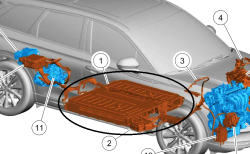
—
A Ford hybrid class action lawsuit alleges a recall of 2020-2024 Ford Escape and 2021-2024 Lincoln Corsair Grand Touring plug-in hybrid vehicles isn’t good enough.
The estimated range for the Lincoln Corsair Hybrid is 28 miles battery-only and 430 miles total, and the Ford Escape Hybrid comes in at 37 miles battery-only and 520 miles total.
Filed by three Ford hybrid owners, the lawsuit says the Samsung high voltage lithium-ion batteries can cause vehicle fires when the hybrids are parked and turned off.
The Ford hybrid battery recall involves more than 20,000 vehicles after battery defects were discovered in Europe.
The Ford Hybrid Battery Recall
The U.S. recall includes 20,484 model year 2020-2024 Ford Escape Hybrid and 2021-2024 Lincoln Corsair Hybrid vehicles. Ford told the government an estimated 1% of the recalled vehicles may be equipped with defective Samsung high voltage batteries.
Ford and Samsung determined:
“The high voltage cell’s separator layer between its cathode and anode may be susceptible to damage as a result of the cell manufacturing process. Separator damage may result in a cell internal short circuit.”
If a battery cell short circuit occurs, the propulsion system may shut down and the hybrid vehicle will lose motive power. But Ford says braking, lighting and steering are not affected. In addition, a hybrid driver will receive a “Stop Safely Now” message.
The high voltage battery may also suffer from thermal venting, something that has caused a hybrid vehicle fire and property damage.
In an updated report from Ford filed with NHTSA and dated February 7, Ford said it received three reports from Europe describing battery thermal venting between April and August 2024. The hybrid battery packs were recovered from the three European vehicles, torn down and investigated by Ford and battery manufacturer Samsung.
CT scans were performed to find the root cause of the hybrid battery venting, and in December 2024 Ford learned of another four incidents of thermal venting, with at least three of those also from Europe. However, one of the incidents led to a vehicle fire which caused property damage.
“While Ford continues to believe features designed to mitigate the effects of venting on affected vehicles, including a high voltage battery pack exhaust manifold used to direct hot gases away from ignition sources and fuel tank heat shielding, are effective at preventing vehicle fires in most instances of venting, based on the occurrence of a vehicle fire and resulting damage, an amendment to the field action was approved at Ford’s Field Review Committee meeting of January 31, 2025.” — Ford
Ford says it isn’t aware of any crash or injury reports, but hybrid customers are warned not to charge their vehicles until dealers have repaired the vehicles.
Ford dealers were told to update the hybrid battery energy control module (BECM) software to detect battery cell anomalies which indicate separator damage. Dealers were told to replace the high voltage battery pack if a battery problem is detected.
The Ford Hybrid Battery Recall Lawsuit
Calling the Ford hybrid recall “inadequate and ineffective,” the plaintiffs assert the battery defect can cause vehicle fires and “explosions” and Ford allegedly knew it before the vehicles were first sold.
But even knowing the batteries caused a “risk of accident, injury, death, or property damage,” Ford “chose profits over safety” and went ahead and sold the hybrids without repairing the vehicles and without warning customers.
“Ford had all the knowledge it needed to anticipate, test for, and prevent the Spontaneous Fire Risk before the vehicles went to market.” — Ford hybrid battery lawsuit
The class action says consumers purchased the hybrid vehicles at premium prices to save money on fuel, but the recall forces customers to skip the electric functions of the vehicles and spend more money on fuel.
“Plaintiffs and class members are forced to pay for gas while increasing their carbon footprint. A plug-in electric hybrid vehicle that cannot be operated in all electric mode and is less efficient than its gas-powered equivalent is not fit for its ordinary purpose.” — Ford hybrid class action
The class action was filed by these plaintiffs:
- Harry Hilburg / Missouri / 2022 Ford Escape PHEV
- Marianne Bigelow / Washington / 2022 Lincoln Corsair Grand Touring PHEV
- William Simmons / Wisconsin / 2022 Lincoln Corsair Grand Touring PHEV
None of the plaintiffs claim their hybrid batteries failed or caught fire, but the owners contend they are concerned about driving their hybrid vehicles and must pay for gas instead of depending on the battery-only functions to save fuel.
The Ford hybrid battery recall lawsuit was filed in the U.S. District Court for the Eastern Division of Michigan (Southern Division): Harry Hilburg, et al., v. Ford Motor Company.
The plaintiffs are represented by Hagens Berman Sobol Shapiro LLP, and The Miller Law Firm PC.

